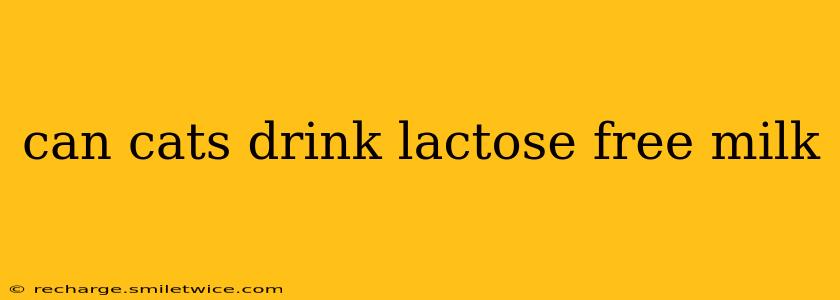Many cat owners wonder if their feline friends can safely enjoy lactose-free milk. While the absence of lactose is a positive step compared to regular cow's milk, the answer isn't a simple yes or no. Let's delve into the complexities of cats and dairy consumption.
Is Lactose-Free Milk Better Than Regular Milk for Cats?
Yes, lactose-free milk is significantly better than regular milk for cats. Regular milk contains lactose, a sugar that many cats are intolerant of. This intolerance can lead to digestive upset, including diarrhea, vomiting, and gas. Lactose-free milk removes this problematic sugar, reducing the risk of these negative effects. However, this doesn't mean it's a suitable replacement for water, their primary hydration source.
What are the Potential Problems of Giving Cats Lactose-Free Milk?
While lactose-free milk eliminates the lactose issue, it still presents other challenges. Cow's milk, even in its lactose-free form, is not nutritionally ideal for cats. Cats are obligate carnivores, meaning their bodies are designed to thrive on a meat-based diet. Milk, whether lactose-free or not, is relatively low in the nutrients cats need and high in things they don't, such as fat. Excessive fat intake can lead to obesity and related health problems in cats.
Furthermore, some cats may still experience digestive discomfort even with lactose-free milk due to other components in the milk. The high fat content can be particularly troublesome for some cats, triggering digestive upset.
Can Kittens Drink Lactose-Free Milk?
The answer is still a cautious no. While lactose-free milk might seem like a better option for kittens than regular milk, their digestive systems are still developing, and even the absence of lactose doesn't guarantee tolerance. Mother's milk provides the optimal nutrition for kittens, and if not available, a veterinarian-recommended kitten formula is crucial. Introducing lactose-free cow's milk could potentially disrupt their delicate digestive balance and lead to complications.
What Kind of Milk is Safe for Cats?
The best "milk" for cats is no milk at all! Water should be their primary source of hydration. If you're looking to provide additional nutrition or a tasty treat, consult your veterinarian. They can advise you on appropriate cat food, supplements, or potentially cat-specific milk alternatives, available commercially, that are formulated to meet their nutritional needs.
What Should I Do If My Cat Drinks Lactose-Free Milk and Gets Sick?
If your cat consumes lactose-free milk and shows signs of digestive upset like vomiting, diarrhea, or lethargy, contact your veterinarian immediately. They can assess your cat's condition, rule out other underlying issues, and recommend appropriate treatment.
Can Cats Be Allergic to Lactose-Free Milk?
While lactose intolerance is common in cats, it’s also possible for them to have a true allergy to other components of cow’s milk, such as proteins like casein and whey. Even in lactose-free milk, these proteins remain, potentially triggering an allergic reaction in sensitive cats. This can manifest as skin problems (itching, rash), respiratory symptoms (sneezing, coughing), or gastrointestinal issues. If you suspect a milk allergy, contact your veterinarian for proper diagnosis and management.
In conclusion, while lactose-free milk might seem like a healthier alternative to regular milk for cats, it's still not the ideal beverage. Water is the best choice, and if you are considering other options, always consult your veterinarian for expert advice tailored to your cat's specific needs and health status. Providing your feline friend with a balanced, nutritionally appropriate diet, and plenty of fresh water is key to their overall health and well-being.
